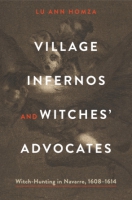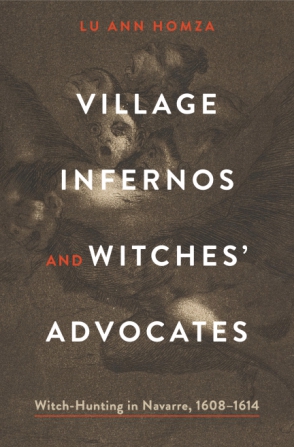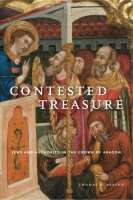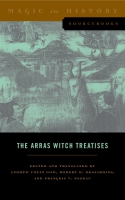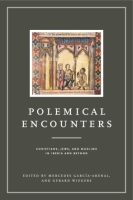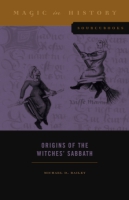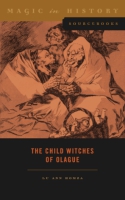Village Infernos and Witches’ Advocates
Witch-Hunting in Navarre, 1608–1614
Lu Ann Homza
“Homza’s clear prose and detailed archival work weave a fascinating micro-history into the larger narrative of the early modern witch-hunts.”
- Media
- Description
- Reviews
- Bio
- Table of Contents
- Sample Chapters
- Subjects
Presenting important archival discoveries, Lu Ann Homza restores the perspectives of illiterate, Basque-speaking individuals to the history of this shocking event and demonstrates what could happen when the Spanish Inquisition tried to take charge of a liminal space. Because the Spanish Inquisition was the body putting those accused of witchcraft on trial, modern scholars have depended upon Inquisition sources for their research. Homza’s groundbreaking book combines new readings of the Inquisitional evidence with fresh archival finds from non-Inquisitional sources, including local secular and religious courts, and from notarial and census records.
Expanding our understanding of this witch hunt as well as the history of children, community norms, and legal expertise in early modern Europe, Village Infernos and Witches’ Advocates is required reading for students and scholars of the Spanish Inquisition and the history of witchcraft in early modern Europe.
“Homza’s clear prose and detailed archival work weave a fascinating micro-history into the larger narrative of the early modern witch-hunts.”
“A fascinating and detailed study of a unique element in the witchcraft mania that swept Europe and New England.”
“Homza’s study will long remain an essential point of reference and an indispensable compass for social, religious and political history due to its critical rigor and interpretive acumen, as well as the amount of documentation examined.”
“. . .this specific module, between 1608 and 1614, of the historical period entitled witch hunts, could constitute a novel study paradigm, since it contains clear and unprecedented local circumstances, useful in the effort to reconsider the diverse approaches that until now have served, more or less, to elucidate a phenomenon as fantastic as it is brutal and real.”
“An almost compulsively readable, deeply humane book that weds empathy for its subjects with a clear understanding of the cultural and administrative context in which they lived their lives. It can be read profitably by newcomers to the field or by experts, and I expect that it will become the standard work on these trials for the foreseeable future.”
“This book will be of interest to anyone researching Catholic history or the treatment of non-Christian minority groups following the Reconquista. It can also serve as an important volume for anyone interested in the occult, as it debunks much of the mythology surrounding occultism, witchcraft, and European witch hunts in the early modern era. Highly recommended reading.”
“Village Infernos and Witches’ Advocates: Witch-Hunting in Navarre, 1608-1614 skillfully draws from inquisitorial and non-inquisitorial sources while highlighting the roles of children and engaging with the history of emotions. As such, it deepens our appreciation of this complicated witch hunt and shows that multiple ‘witches’ advocates’ helped bring this dramatic event to its end.”
“A wonderful addition to the scholarship not only on the witch-trails of Navarre but also witch-hunts throughout Europe and the Spanish Inquisition at large.”
“Homza’s research brings to the table a wealth of materials previously neglected or overlooked. Bristling with new and important insights into the village dynamics underlying Spain’s only serious witchcraze, Homza examines it from two quite different perspectives: that of the men, women, and most originally, the children implicated in individual accusations of witchcraft, and that of the learned inquisitors charged with investigation of individual cases. She also successfully positions the Navarre witchcraze within the wider compass of recent historiography on witches and witchcrazes in other parts of early modern Europe. This remarkably readable, comprehensive, insightful and nuanced study deserves a wide audience.”
“Village Infernos and Witches’ Advocates employs a wide range of sources to provide a multi-angled view of the hunt as it developed. It also takes into account important developments in the field of history, principally in terms of social history and history-from-below, allowing for a startling and much-needed degree of revisionism. Its interpretation is new and greatly welcome. It will be a very important and widely cited book.”
Lu Ann Homza is Professor of European History at William & Mary. She is the author of The Spanish Inquisition, 1478–1614: An Anthology of Sources and Religious Authority in the Spanish Renaissance.
Acknowledgements
Introduction
1. Trauma
2. Spiritual and Social Combat
3. Legal Decisions, Legal Errors
4. Collaboration, Obedience, Resistance
5. Transgressions and Solutions
Epilogue
Notes
Bibliography
Index
Download a PDF sample chapter here: Introduction
Mailing List
Subscribe to our mailing list and be notified about new titles, journals and catalogs.
